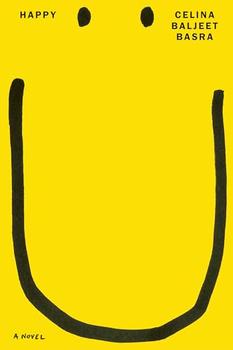Summary | Excerpt | Reading Guide | Reviews | Beyond the Book | Readalikes | Genres & Themes | Author Bio

A Novel
by Celina Baljeet BasraPrologue
I am Happy. Happy Singh Soni.
A Punjabi currently based in Italy, I am working full-time on Europe's largest radish farm.
I am well experienced in all tasks related to radish farming: i.e., sowing radish seeds, transplanting radish sprouts, tending to the growing plants, injecting weed killers most expertly, spraying to death the ugly ones and caring for the beauties. By eradicating all uncer- tainty, the harvest is bountiful, always.
First and foremost, my labor is a labor of love.
I feel confident that I have reached a level of excellence in European radish farming. Hence, I want to widen my skill set and actively seek new challenges by exploring other aspects of farming in Italy. This is why I am applying for the open position as a shep- herd on the island of Sardinia.
Also, I have to admit, my back would thank me if I were able to work in an upright position once more. The constant kneeling amidst the radish patches is killing my spine. I often catch myself these days musing among the vegetables, stretching my back, unable to recall who I am. For a brief moment, I exist in a blank space: a white cube smelling of lemony cleaning agent. Time expands and contracts. I pull myself back into reality by looking at my hands, greenhouse dirt underneath surprisingly rosy fingernails. The sight of my skin roots me. Brown skin with tiny pink injuries from tiny radish shovels.
What are the long-term effects of constant spine bending? Is spinelessness the desirable state after all?
I am empathic, flexible, and resilient. The journey from India, crossing deserts, mountains, walking through a vast forest I cannot name, and arriving via boat in Bari, certainly did take its toll. However, I am still alive, and I am at your service, or rather at the service of your black Sardinian sheep, pecore nere.
I can drive a tractor and a truck. I have never taken a taxi in my life, nor have I boarded a plane. I am excitable and impatient, char- ismatic, and single-minded. I anticipate, always. I look ahead. I identify the problem before you even know you have one. I am per- petually hungry, and I always need a snack. I miss pakoras. I miss my morning tea. I miss my mother. I tend to suffer from diarrhea more often than from constipation. My metabolism is as fast as my mind. By jumping two steps ahead, I tend to fall back three, ending up behind the starting line. But I always get back on that horse, as one should. Though I cannot ride a horse; I've only ever ridden a camel—once, at a fair, and I threw up right after. I am a Hypersensi- tive Introverted Extrovert. I did a test online. My love language is Words of Affirmation. I did that test, too. Most of the workers here are Sikhs like me, but, still, it tends to get lonely. I cannot say that I am happy, but I am lucky to be here, in Europe.
Strictly speaking, and I don't want to beat around the bush, my status of residency is not legal. Illegal? You may very well say so, but I couldn't possibly comment. I am currently in between nationalities, but I am certainly doing my part for the European people: providing them with the cheapest, crunchiest, reddest, and raddest radishes, bulbous and disproportionately huge, to be chopped up into European salads and to decorate European sandwiches. Let's forget about the taste for a moment, watery, carrying a faint sharpness, just a memory of its ancestor radish's sapid glory: earthy and spicy, delicate in flavor. According to my research, radishes were domesticated in Asia prior to Roman times, growing happily for a long time in what is now China, Myanmar, Vietnam, and India.
I admit, I care too much. On a frosty night in spring, I was caught sleeping with the fledgling radish sprouts, covering them in Indian scarves and blankets. Some might say I cross boundaries; I say I am passionate about my job. Leave your emotions at home? I say bring them to the workplace. That's the only way to get the job done. Crying is fine. People who cry at work are better workers, always. Those are the workers you want.
Excerpted from Happy by Celina Baljeet Basra. Copyright © 2023 by Celina Baljeet Basra. Excerpted by permission of Astra House. All rights reserved. No part of this excerpt may be reproduced or reprinted without permission in writing from the publisher.
Censorship, like charity, should begin at home: but unlike charity, it should end there.
Click Here to find out who said this, as well as discovering other famous literary quotes!
Your guide toexceptional books
BookBrowse seeks out and recommends the best in contemporary fiction and nonfiction—books that not only engage and entertain but also deepen our understanding of ourselves and the world around us.